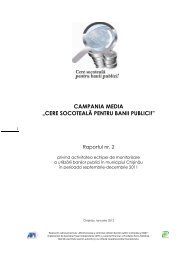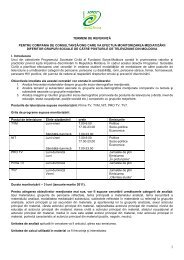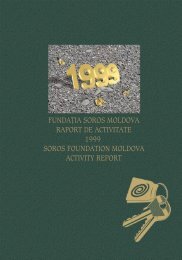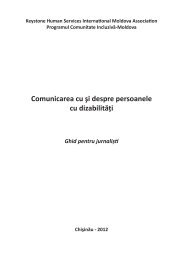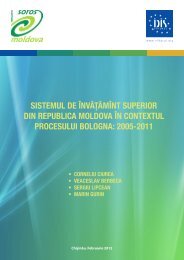Managing Intractable Conflicts: Lessons from Moldova and Cyprus
Managing Intractable Conflicts: Lessons from Moldova and Cyprus
Managing Intractable Conflicts: Lessons from Moldova and Cyprus
Create successful ePaper yourself
Turn your PDF publications into a flip-book with our unique Google optimized e-Paper software.
Introduction<br />
13<br />
both the similarities <strong>and</strong> differences between the <strong>Cyprus</strong> <strong>and</strong> Transnistrian cases<br />
<strong>and</strong> also addresses the content versus context friction of the respective negotiation<br />
processes.<br />
Based on first-h<strong>and</strong> information <strong>and</strong> know-how acquired during the field visits, the<br />
international team of experts participating in this project produced the following set<br />
of recommendations for stakeholders involved in the search for a comprehensive<br />
settlement of the Transnistrian <strong>and</strong> <strong>Cyprus</strong> problems:<br />
• Utilize the available opportunities; show flexibility <strong>and</strong> focus on delivering<br />
step-by-step progress in negotiations between the two sides so that further<br />
protracting or backtracking of the talks is avoided;<br />
• When challenges prevent progress in establishing the content of the negotiations<br />
agenda, redirect the focus on developing the context of the talks<br />
in order to keep the negotiation process alive at all times;<br />
• Increase contacts <strong>and</strong> direct communication between the two parties at<br />
all levels <strong>and</strong> encourage cooperation as well as consultation between the<br />
political leadership <strong>and</strong> civil society, i.e. interconnect track one <strong>and</strong> track<br />
two diplomacy;<br />
• Focus cross-divide cooperation on mutual growth <strong>and</strong> development; address<br />
challenges that require immediate attention, e.g. the management of<br />
natural resources; <strong>and</strong> propose joint solutions, which could leverage the<br />
impact of remittances;<br />
• Support the implementation of initiatives <strong>and</strong> grass roots programs that<br />
aim to diminish stereotypes about the “other side”, including changing<br />
the schoolbooks featuring historical narratives of the respective conflicts;<br />
build trust; <strong>and</strong> prepare the publics for accepting a prospective political<br />
settlement;<br />
• Support cooperation between journalists <strong>from</strong> both sides; organize joint<br />
trainings on responsible journalism, social media <strong>and</strong> community media<br />
in order to encourage balanced <strong>and</strong> impartial coverage of issues related<br />
to the negotiation process, the future settlement as well as issues of joint<br />
interest; <strong>and</strong> to reach a wider audience;<br />
• Initiate programs of economic, trade <strong>and</strong> entrepreneurial development to<br />
increase cooperation <strong>and</strong> interdependence between both sides <strong>and</strong> consequently<br />
reduce the influence of actors with vested interest in maintaining<br />
the status quo.




